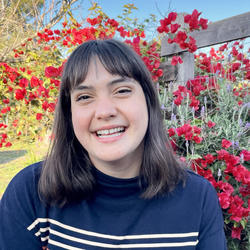Sage Gerson
Sage Gerson (she/hers) is a nonnative scholar whose research resides at the intersections of the environmental humanities and the study of Western colonial modernity through a perspective informed by Native Studies and Black Studies. Growing out of her research, her teaching asks students to dwell with cultural imaginaries and environmental storytelling that provide glimpses of a differently perceivable world, where other formations of environment, identity, power and resistance are possible.
Gerson is currently working on a book-length project focused on electrified literary imaginaries that complicate linear narratives linking electricity with progress, instead favoring transformative environmental perspectives that exceed developmental and extractive frameworks. She is also coediting the anthology Waste Collection: The Ecologies, Politics, and Complexities of Discard, which is under contract with Bloomsbury (expected 2027). You can find her research published in the journals Interdisciplinary Studies in Literature and Environment (ISLE), Social Text, Media+Environment, and the Cultural Studies Association’s Lateral, among other places.
Gerson’s research has been generously supported by the ACLS and Mellon Foundations, as well as the University of California Humanities Research Institute. She received her PhD in English from the University of California, Santa Barbara, where she also completed an interdepartmental PhD emphasis in Environment and Society.
Academic areas of interest
- indigenous literatures and ecologies
- environmental justice
- the energy humanities and infrastructure studies
- anticolonial and decolonial theory
- Native, Black, and Women of Color feminisms
- queer ecologies
- 20th- and 21st-century literatures
- futurisms, futurity, nonlinear futures, and speculative fiction
